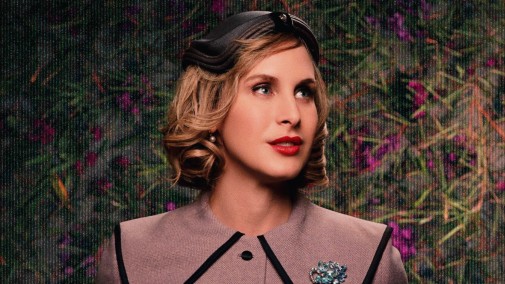Sundance: The quandaries of 'Framing Agnes'
 Sunday, January 23, 2022 at 4:33PM
Sunday, January 23, 2022 at 4:33PM 
In the running time discourse, I'm firmly in the pro-long films camp, believing that a short duration is in no way indicative of cinematic discipline. Even so, it's easy to understand where people like Nathaniel come from. Everyone has seen some messy movie and came out thinking it could have been stronger if a dozen or so minutes had stayed on the cutting room floor. That being said, the reverse can happen when a project has great potential but kneecaps itself by being too brief, unable to develop its ideas. Chase Joynt's Framing Agnes is one such effort, full of fascinating information and captivating thoughts, not to mention good intentions. Unfortunately, at 75 minutes, this documentary flies by without time to explore any of its ideas with adequate depth…
Even when one considers history through a queer lens, trans stories are challenging to come by, often ignored and erased. Expanding his previous short film of the same name, Joynt has tried to shed light on what was going on at UCLA in the midcentury. For many, Harold Garfinkel's research subject A, referred to as Agnes, persists primarily as an infamous anecdote - a trans woman who managed to fool the medical authorities and researchers, getting a gender confirmation surgery out of it. Diving into the professor's archives, Joynt and sociologist Kristen Schilt, uncover secrets stored in a cabinet rusted shut. Beyond subject A, Garfinkle interviewed and studied many other trans individuals, precious glimpses into trans lives and community in a time long by, including the experiences of queer POC and trans teens.
Only transcripts survive, impersonal records of conversations long lost to time. How the filmmakers chose to solve the quandaries of presenting this research is where Framing Agnes may win or lose its prospective audience. Inspired by the role the talk show had among a certain generation of trans people, their first awareness of non-cis identities, the director stages each interview like a televised event, complete with silvery black-and-white and period costumes. Playing Garfinkel as a primetime host, Joynt is joined by a cadre of talented actors who bring their own perspectives to this study. Indeed, most of the doc comprises a back-and-forth between scripted dramatization and more straightforward cast interviews, discussing their "characters" and how much has and hasn't changed between postwar America and our contemporary times.

Zackary Drucker, Jen Richards, Silas Howard, Angelica Ross, and Stephen Ira Cohen make up the cast, each bringing a personal POV to the matter of examining trans history. However, by emphasizing the talk show device and the performers' self-reflection, Joynt ends up obscuring the history he purports to showcase. Watching Richards ponder her subject's confidence, her talk of a trans community and support network, one gets frustrated by how insular Framing Agnes ends up being. Why not pursue these avenues of thought, actually exploring the different experiences of each interviewee? It constantly feels as if the documentary is on the crest of some fascinating deep dive, only to retreat to a comparatively shallower register. The focus and structural consistency are admirable, but they hold the film back.
The same happens with Ross and her subject's specificities as an African-American trans woman from a deeply religious family, or Cohen's take on a potentially sarcastic teen boy. Despite one's affection for actors, it's easy to grow frustrated at how much Framing Agnes willfully reduces itself to an acting exercise when it could have been much more. Historian Jules Gill-Peterson is a beacon of light in all this. Her input goes beyond a direct comparison of how things were then and now. When the camera falls on her, the documentary's relationship to history gets complicated and more multifaceted. The academic's care for these figures is heartfelt, but there's also a necessary acknowledgment that we'll never be able to fully know them. We can only grasp what they mean to us, our identities, and our understanding of the context they lived in.
For as much as I appreciate Joynt's love of meta-cinema and formal adventurousness, Gill-Peterson's simpler talking head passages are the true treasure contained within Framing Agnes.
 Angelica Ross,
Angelica Ross,  Chase Joynt,
Chase Joynt,  Framing Agnes,
Framing Agnes,  LGBTQ+,
LGBTQ+,  Review,
Review,  Sundance,
Sundance,  documentaries,
documentaries,  running times
running times 


Reader Comments (1)
Thank you, Claudio! I was going back and forth weather to choose this one or not… I guess I’m lucky now, that at the end of the day decided to pass (even though I thought the director’s last documentary was special and good).
Instead, have watched 14 films so far and “Cha Cha real smooth” ranks my favourite (so far)…What a cute little romcom!
Second best is (don’t know why, but “surprisingly”) deep, existential and philisophical “After Yang” (with Colin Farrell). And third- the real life hostage-story about “892” dollars.